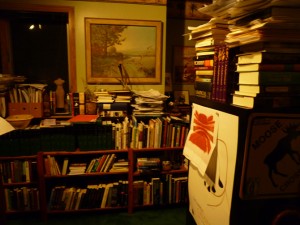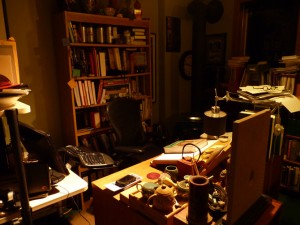Beltane Waning Last Frost Moon
We continue sliding toward summer, a cool, moist descent, not at all like the sudden, blazing ascension we often see, usually full on in place by now, with sun screen and hats and pitchers of lemonade set out on patios. At some point it will warm up, at least I think it will. There have been years without summer, years when the weather remains much like what we have now, days cool in the morning, warming in the afternoon and falling off to cool nights. Could be this will be one of those summers.
I’ve worked this morning on Pentheus, the first few verses proving difficult for me, almost as if I’d entered a different text altogether though it’s only 300 verses away from Diana and Actaeon and in the same Book, III of XV.
Something captivates me as I get into the Latin flow, the world tunes out; the text and I begin this tug of war, me digging, using dictionaries and online aids, the text resisting, remaining stubborn, not allowing its meaning to emerge without a struggle. The tension between the text and me lies in the language of an ancient people and my learning, a tension requiring both, learning and the language. Without some knowledge, there would be no tension. If I had no learning, the words in Latin would sit immutable as stone, as strong a barrier to me. If my learning were to the level of fluency, the text would not be a barrier at all, I would read as I do in English. Instead, I’m in a middle place, knowing and learning at the same time, so the text became enticing, pulling me further into the journey, not only of Ovid’s texts, but of the others: Cicero, Caesar, Livy, Martial, Tacitus, Horace, Seneca.
The feeling reminds me of how I reacted to serious study of art history. At first there was so much information, so many different aspects that I felt overwhelmed, as if I could never get my head above the surface of this great ocean of learning. As time passed, as I walked the halls of the museum, read texts and looked at more and more art, a shaky gestalt began to form. There was a rough chronology, even a global chronology. There were styles and forms and methods and instances of all three. At some point the Song Dynasty became separate from the Tang and the Han, just as the early Buddha images became distinct from the later ones of Tibet, Thailand, China. Neoclassicism and impressionism began to tease themselves apart and appear as separate, thought related movements. Beckman and Kandinsky and Monet and Barye and Poussin and Church and the master of the embroidered foliage sorted out into times and influences and basic tenets.
(of course, like most of us, I’m a combination of autodidact and schooling, but since college, the autodidact part has definitely taken precedence.)
Now I have a scaffolding on which I can hang new learning, it fits in a large gestalt, which, while far from comprehensive, at least describes the outlines, the places where there are gaps and the places where some new learning easily fits.
Right now Ovid and his Metamorphoses are my teachers, aided by my tutor Greg Mambres and my own reading, learning. My scaffolding is up, but it’s very shaky. I have verb forms, conjugations, nouns, declensions, adverbs, participles, clauses, imperatives, word meanings, poetic forms but often I revisit and revisit the same learning, still not seeing with clarity where on the scaffold something belongs.
It was the same with the garden, first flowers and then vegetables and is still now with the bees. Large tracts of unknowing papered over by fragments of knowledge. In bee-keeping for example I look at cells. Hmmm. Those look like drone cells but maybe they’re queen cells. Or maybe not. Is it time to put on the second hive box? Or, is it too early? Should I use full-sized hive boxes or should I switch to honey supers to keep things lighter? In gardening. Just try planting garlic in the spring some year. Won’t work. It needs to over winter for a late June harvest. Want a colorful spring and early summer? Plant in the fall. In the orchard I’m practicing IPM, integrated pest management, which means at this point, killing bugs by hand.
What I’ve learned is that knowledge accumulates. New knowledge needs a scaffolding, a chest of drawers, a memory palace so that it can become integrated.

 bookshelves are full and many have books piled on top of them. Each one I want to read. Some I want to use only as reference, but most I want to read cover to cover. The books range in topic from fairy tales and folklore to basic scientific texts on biology and geology, from philosophy to theology, art history to renaissance life, china, japan, india and cambodia to single dictionaries and the multiple volumes of the OED and the Dictionary of Art. Of course there is fiction, too, and poetry, works on historiography and works on the enlightenment. This doesn’t count the 90 books I now have on my kindle, many fiction, but many non-fiction, too.
bookshelves are full and many have books piled on top of them. Each one I want to read. Some I want to use only as reference, but most I want to read cover to cover. The books range in topic from fairy tales and folklore to basic scientific texts on biology and geology, from philosophy to theology, art history to renaissance life, china, japan, india and cambodia to single dictionaries and the multiple volumes of the OED and the Dictionary of Art. Of course there is fiction, too, and poetry, works on historiography and works on the enlightenment. This doesn’t count the 90 books I now have on my kindle, many fiction, but many non-fiction, too. include the histories of Herodotus and substantial commentary. The Mahabharata. Several works on Asia art. A cabinet full of books on the enlightenment and liberalism. Another cabinet full on calendars and holidays. I will never do it. Why? Because I do have interests, obsessions maybe, that take me out into the garden or over to the State Capitol and the Minnesota Institute of Arts, the homes of the Woolly Mammoths and our children. Kate and I will, I imagine, resume at least some of our SPCO attending when she retires and there will be travel, too.
include the histories of Herodotus and substantial commentary. The Mahabharata. Several works on Asia art. A cabinet full of books on the enlightenment and liberalism. Another cabinet full on calendars and holidays. I will never do it. Why? Because I do have interests, obsessions maybe, that take me out into the garden or over to the State Capitol and the Minnesota Institute of Arts, the homes of the Woolly Mammoths and our children. Kate and I will, I imagine, resume at least some of our SPCO attending when she retires and there will be travel, too.